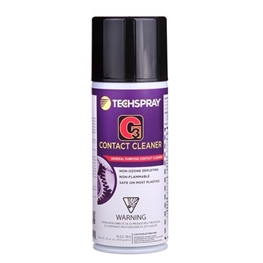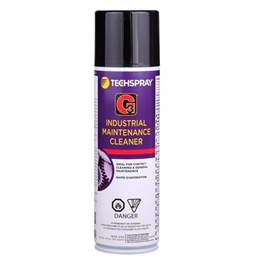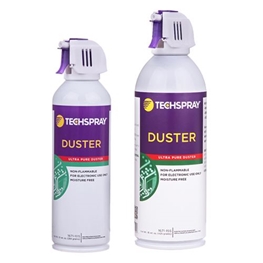접점 세척제 (또한 전기 세척제, 스위치 세척제, 전기 접점 세척제, 자동차 수리 세척제, 배터리/단자 세척제)는 전기 접촉장치, 커넥터, 스위치 및 이동 표면 접촉장치가 있는 전기 및 전자 구성품의 전도성 표면에서 오염물질을 제거하도록 설계되었습니다.
가능한 닦아내거나 문지르지 않고 가능한 신속하게 절연 오염물을 제거하기 위한 세척제입니다. 접점 세척제는 일반적으로 교반을 일으켜 커넥터의 모든 틈새에 도달하도록 분사하고 편리성을 위해 가압 에어로졸 포장이 됩니다. .
Techspray는 스프레이 및 벌크 포장된 다양한 전기 접점 세척제를 제공하고 있습니다. 이 접점 세척제는 접점, 금속 스위치, 모터, 계전기, 발전기, 에지 커넥터, 버스 바, 회로 차단기, 저울, 센서에서 산화물, 기름, 기타 오염물질을 제거합니다.
Techspray 접점 세척제의 장점:
- 강력한 세척제 - 그리스와 오일이 바로 흘러내려갑니다.
- 더 안전한 용제 - TCE, nPB 또는 Per을 함유되지 않았습니다.c
- 대부분의 일반적인 플라스틱에 안전
- 스프레이 캔과 벌크 포장이 됩니다
유전체 고장
적용된 필터
자주 묻는 질문
커넥터의 접촉면이 금속이지만 종종 외부 환경으로부터 차단하기 위해 플라스틱, 고무 개스킷 내에 둡니다. 접점 세척제의 용제가 플라스틱에 부적합한 경우 재료에 잔금이 가거나 취화되거나 연화될 수 있습니다. 고무 시일은 강한 용제에 노출되면 팽창, 수축 또는 용해될 수 있습니다. ABS, 폴리카보네이트 (상표명 Lexan), Plexiglass와 같은 아크릴 재료와 같은 단단한 플라스틱은 톨루엔, 크실렌, 아세톤과 같은 강한 용제에 매우 민감할 수 있습니다. 알코올 및 탄화수소계 용제는 민감한 플라스틱에서 더 잘 작용하는 경향이 있습니다. 탄성 (소프트) 재료로 된 고무, 실리콘 또는 기타 시일 또는 개스킷은 강한 용제에 노출되면 팽창하거나 수축하는 경향이 있습니다. 용제가 갑자기 온도가 내려가면 원래의 치수로 돌아가면서 시일 효과에 영향을 줄 수 있습니다. 폴리에스테르 또는 Teflon계 개스킷 재료는 강한 용제로 인한 이러한 손상이 덜합니다. 새 접점 세척제를 의심쩍은 용도로 사용하기 전에 가압 (및 고가의) 장비를 사용하여 시험해야 합니다.
절연 내력은 파괴되지 않고 이상적인 조건 하에서 재료가 견딜 수 있는 최대 전계로서 정의됩니다. 이 의미의 피괴는 절연 특성 결함을 나타내며, 여기서 전기는 전도체에서 벗어나서 절연재의 가장 취약한 영역을 통해 연소시킵니다. 자유 전기가 충분해지면 즉시 또는 10억분의 1초로 절연재를 통해 방전됩니다. 방전되지 않으면 절연되지 않는 지점까지 심각하게 저하됩니다. 따라서, 절연 내력이 높은 세척제가 필요해집니다. 탄소와 같은 특정 오염물은 전기의 유효 도체이며, 세척액과 오염물의 전도성을 함께 고려해야 합니다. 세척제를 사용하는 동안 사용자를 보호할 수 있는 절연체로서 역할을 기본적으로 하면서 가압된 표면을 세척하고, 전기를 사용자에게 또는 절연재로 전도하지 않고 세척하고 있는 회로를 손상시키지 않아야 합니다. 접점 세척제를 선택할 때 제품 사양의 절연 내력을 확인합니다. 숫자가 높을수록 더 좋으며 30 kV (30,000 volts) 미만의 가압된 접점에 분사하지 않아야 합니다.
장비, 작동 환경 등과 같은 환경적 요소뿐만 아니라 전압 및 암페어 수에 따라 안전성이 매우 달라지기 때문에 모든 상황에 대해 확답을 드릴 수 없습니다. 반면에, 절연 내력 또는 절연 파괴 전압이 높은 접점 세척제를 사용하면 가압 장비를 세척해야 하는 경우 안전성이 높아집니다. 분사하기 전에 전원을 차단해서 스파크, 전기 단락 또는 방전, 기타 안전 위험요소를 반드시 피해야 합니다. 어떤 이유든 전원을 분리할 수 없다면 30 kV (30,000 volts) 이상의 절연 내력을 갖는 전기 접점 세척제를 찾아보세요. 불연성 세척제를 사용하면 스파크로부터 보호하는 안전 층이 추가됩니다.








